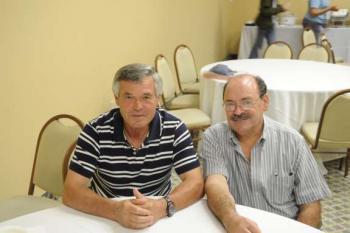Manuel “Manny” Vinagre

The Working Waterfront Festival Community Documentation Project
This project documents the history and culture of the commercial fishing industry and other port trades. The project began in 2004 in conjunction with the Working Waterfront Festival, an annual, educational celebration of commercial fishing culture which takes place in New Bedford, MA. Interviewees have included a wide range of individuals connected to the commercial fishing industry and/or other aspects of the port through work or familial ties. While the majority of interviewees are from the port of New Bedford, the project has also documented numerous individuals from other ports around the country. Folklorist and Festival Director Laura Orleans and Community Scholar and Associate Director Kirsten Bendiksen are project leaders. The original recordings reside at the National Council for the Traditional Arts in Maryland with listening copies housed at the Festival's New Bedford office.
Laura Orleans
Manuel “Manny” Vinagre, a retired fisherman and boat owner, was born on December 17, 1940, in Buarcos, a village in Figueira da Foz, Portugal. He began working on the water at the age of 8, unloading sardine boats in his hometown. Manny comes from a long line of fishermen, including his father, grandfather, and uncle. His father tragically lost his life at sea while on a Gloucester dragger. Manny spent ten years fishing as part of the Portuguese “White Fleet,” dory fishing for cod off the coast of Newfoundland. He later became a draggerman and boat owner in New Bedford, Massachusetts, where he still owns the F/V SEA SIREN. Despite the dangers and close calls he experienced while fishing, Manny remains proud of his career and his contribution to the fishing industry.
Scope and Content Note
This interview with Manuel “Manny” Vinagre, conducted by Mark Starr and transcribed by Laura Orleans, took place on September 26, 2010, at the Fairfield Inn during the Working Waterfront Festival . The interview was translated by Joe Vinagre. The interview provides a detailed account of Manny's life and career as a fisherman, beginning with his early years in Portugal, where he started working on the water at the age of eight. Manny shares his experiences fishing as part of the Portuguese “White Fleet,” including the daily life of dory fishing, the size of the codfish in the old days, and several close calls at sea. Manny also discusses his later career as a draggerman and boat owner in New Bedford, Massachusetts, including incidents with rogue waves and his philosophy of going out in bad weather to beat the rest of the fleet and get a good price for the catch. The interview also touches on Manny's family history, including the story of his grandfather who lost his arm when a grenade landed on the deck of his boat, and his father who was lost at sea. Manny also shares that his children and grandchildren are not in the fishing industry. This interview provides valuable insights into the life and experiences of a Portuguese fisherman in the mid to late 20th century, both in Portugal and the United States.
Please Note: The oral histories in this collection are protected by copyright and have been created for educational, research and personal use as described by the Fair Use Doctrine in the U.S. Copyright law. Please reach out Voices@noaa.gov to let us know how these interviews are being used in your research, project, exhibit, etc. The Voices staff can help provide other useful resources related to your inquiry.
The NOAA mission is to understand and predict changes in climate, weather, oceans, and coasts, to share that knowledge and information with others, and to conserve and manage coastal and marine ecosystems and resources. The Voices Oral History Archives offers public access to a wide range of accounts, including historical materials that are products of their particular times, and may contain offensive language or negative stereotypes.
Voices Oral History Archives does not verify the accuracy of materials submitted to us. The opinions expressed in the interviews are those of the interviewee only. The interviews here have been made available to the public only after the interviewer has confirmed that they have obtained consent.
